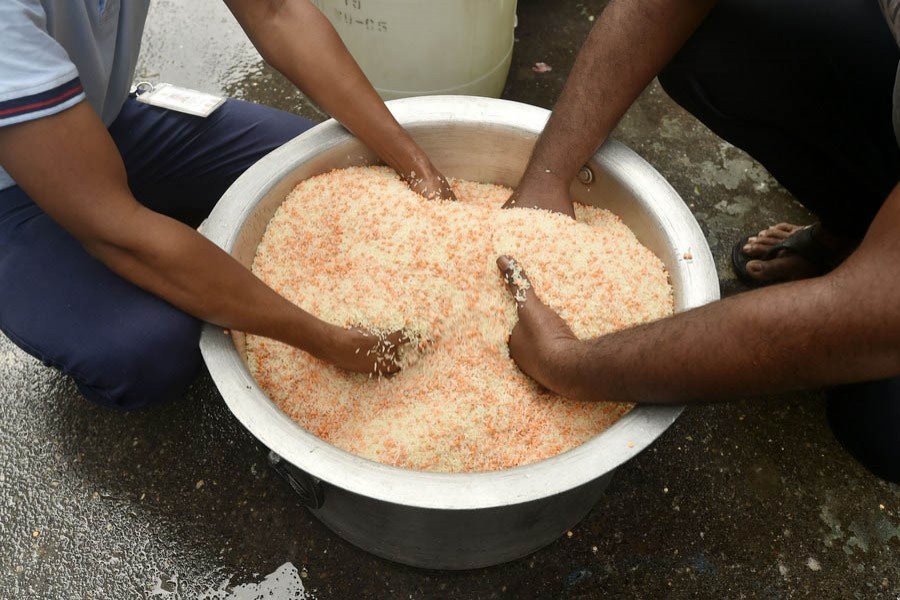
Published :
Updated :

The majority of people the world over would like to forget the year 2022 along with the preceding two pandemic years. If unrelenting processions of patients towards hospitals and the dead to the graveyards or crematories marked the pandemic years, the post-Covid period saw the shreds of smashed hopes and dreams of a new beginning of life for millions of people around the world.
At a time people had just somehow managed to survive the attack of the deadly virus at a heavy price or could avoid its ubiquitous reach also at financial and mental costs and were preparing for a turnaround, they were surprised by a different kind of body blow ---this time by business czars, particularly those who command monopoly over trade in fuel oils, and politicians playing a sinister game with the fate of the vulnerable and poor people all across the globe.
As many as 345 million people face starvation worldwide, according to the UN World Food Programme. Of this number facing food crisis, 50 million are suffering from acute malnutrition and are on the verge of confronting famine. The prediction for 2023 is even direr. So far food production has not been a problem, it was the availability or distribution of food. Unprecedented currency depreciation and high food inflation in the aftermath of atrocious rise in energy price and Russo-Ukraine war along with loss of employment have eroded the purchasing power of lower-income to middle-income people.
A WFP analysis can shed light on this. In Lebanon the food inflation was 240 per cent, in Zimbabwe 309 per cent, in Venezuela 155 per cent, in Sidan 149 per cent. Even in Germany, food inflation soared to 16.6 year-on-year last August, in the European Union (EU), it was 12.8 per cent and the US also recorded 10.9 per cent food inflation in August compared to 8.5 per cent in July.
Add to this the plummeting currency value of many countries, the woes of common people can best be imagined. Loss of currency value for Zimbawe was 83 per cent while it was 44 per cent for Sri Lanka. Bangladesh taka has shrunk in value against the greenback to an unprecedented level. However, in a sellers' market like this, the buyers find themselves more at the receiving end because of contrived and manipulated market. The twin toxic impact has already taken a heavy toll on the marginal section of people. That people are desperate to procure rice, wheat and other basic food items from the TCB (trading corporation of Bangladesh) trucks explains this unpalatable reality.
Globally, high food inflation is responsible for unavailability of victuals for a large number of vulnerable people. But the outlook for the 2023 is grimmer because food output will shrink next year because of a number of natural calamities and adverse environment for agriculture. Quite a number of such calamities the planet has already become a witness to. High summer was severer than ever before in some of the European countries. Unprecedented floods in Japan and elsewhere along with the bushfire or wildfire in Australia, America and Brazil are now being capped with extreme low temperature and blizzard. All this will definitely have negative impact on agriculture.
Then what prospect lies ahead for Bangladesh so far as food security is concerned? Surely, the country is not among the 82 countries facing starvation. Its Aman paddy yield is likely to be bumper or near bumper. Yet unless the next Boro cultivation takes off on a healthy note and the harvest is equally good, food price will soar further because of the corresponding gap between demand and supply. Even more critical will be the poor and marginal sections' access to food because of the market volatility.
It is not for nothing that the country's prime minister has time and again been pleading for using every inch of arable land for cultivation of food. She is quite aware of the mismatch of the Bangladesh Bureau of Statistics' figures of food output and the country's need for the same. The procurement prices fixed by the ministry concerned is uninspiring for growers to sell their food grains to the procurement teams. When the price in the open market is substantially higher, why should they dispose of their grains to the government warehouses?
This makes the matter worse for the government to feed the vulnerable under its several food security programmes. The network, moreover, cannot provide the desirable service because of irregularities in selection of the deserving candidates and other malpractices. In fact some dishonest people's representatives and their cohorts at the grassroots level are bringing a most appreciable initiative to disrepute.
There is every possibility that food prices in the international market will go up next year. So, it would be wise not to depend on import of food. The country's agricultural scientists have done a wonderful job by developing more varieties of paddies---some of those heat- and saline-tolerant. A few such seeds are already scheduled for distribution among farmers. Maybe, the combined efforts will be rewarding enough for averting a food crisis. However, feeding the low-income groups will still remain a daunting challenge.


 For all latest news, follow The Financial Express Google News channel.
For all latest news, follow The Financial Express Google News channel.